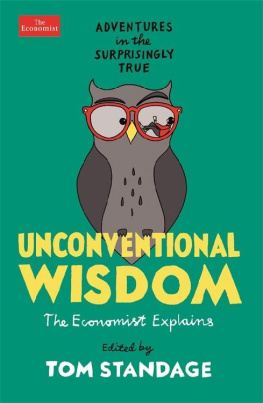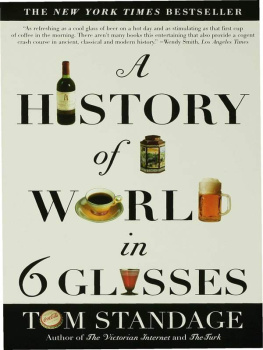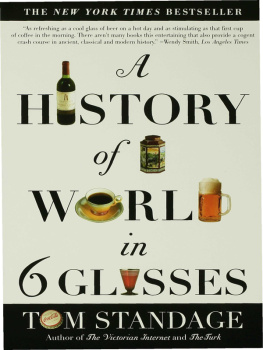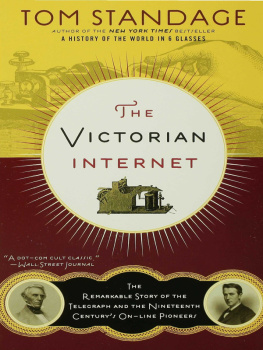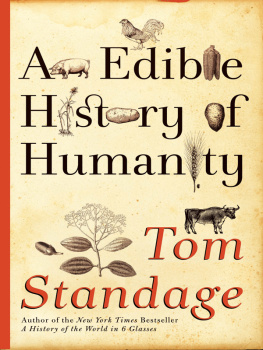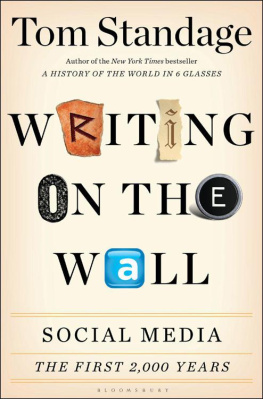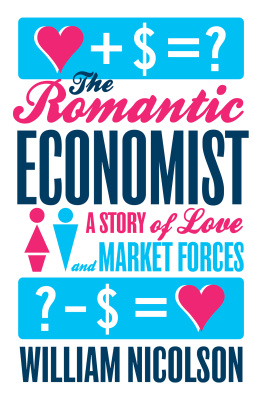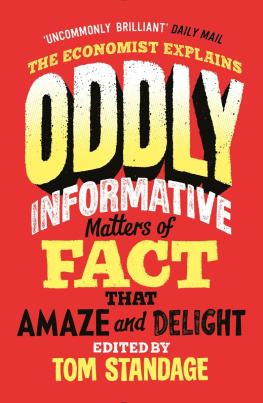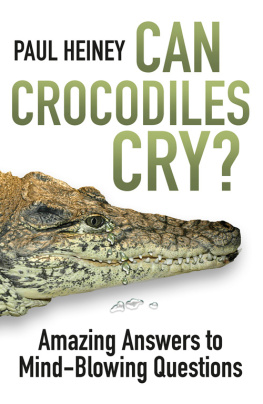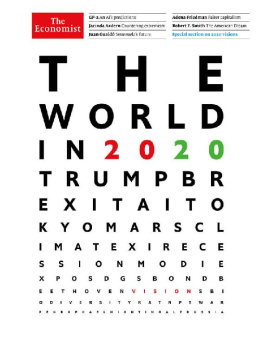UNCONVENTIONAL
WISDOM
TOM STANDAGE is deputy editor of The Economist and the author of six books, including A History of the World in 6 Glasses . His writing has also appeared in the New York Times , the Daily Telegraph , the Guardian and Wired . Unconventional Wisdom is the sequel to Go Figure , Seriously Curious and Uncommon Knowledge , also edited by him.
UNCONVENTIONAL
WISDOM The Economist Explains ADVENTURES in the SURPRISINGLY TRUE
Edited by
TOM STANDAGE

Published in 2020 under exclusive licence from The Economist by
Profile Books Ltd
29 Cloth Fair
London EC1A 7JQ
www.profilebooks.com
Copyright The Economist Newspaper Ltd 2020
All rights reserved. Without limiting the rights under copyright reserved above, no part of this publication may be reproduced, stored in or introduced into a retrieval system, or transmitted, in any form or by any means (electronic, mechanical, photocopying, recording or otherwise), without the prior written permission of both the copyright owner and the publisher of this book.
The greatest care has been taken in compiling this book. However, no responsibility can be accepted by the publishers or compilers for the accuracy of the information presented.
Where opinion is expressed it is that of the author and does not necessarily coincide with the editorial views of The Economist Newspaper.
While every effort has been made to contact copyright-holders of material produced or cited in this book, in the case of those it has not been possible to contact successfully, the author and publishers will be glad to make amendments in further editions.
Typeset in Milo by MacGuru Ltd
Printed and bound in Great Britain by CPI Group (UK) Ltd, Croydon CR0 4YY
A CIP catalogue record for this book is available from the British Library
ISBN 978 1 78816 613 3
eISBN 978 1 78283 751 0

Contents Introduction: in praise of unconventional wisdom
THE CONVENTIONAL WISDOM that body of knowledge that is generally assumed to be true has its limits. It is certainly incomplete; it can be out of date; it may contain errors. The wise man, as Socrates put it, is he who knows what he does not know, and thus understands that his wisdom has limits. So it is with the conventional wisdom. Rather than pretending that it is perfect, it is surely better to acknowledge that it has flaws, and strive to address them by extending, maintaining and updating it.
That is where unconventional wisdom comes in, in the form of new knowledge, unexpected findings and deeper explanations of what is already understood which can only be found by venturing beyond the intellectual frontier of what is already known. The resulting discoveries are often surprising, exciting and counterintuitive. They may also be incorrect. Unconventional wisdom must be tested carefully against the conventional kind. But where it passes that test, it can be gradually integrated into the body of conventional wisdom as it becomes more widely known and accepted. And then the cycle continues.
This book is a collection of reports from beyond that boundary of accepted knowledge, on a wide range of topics, drawn from The Economist s output of explainers and charts. It brings together new findings and explanations that are not merely surprising, but that also, as far as we can tell, happen to be true. And knowledge that is surprisingly true, though it starts out as unconventional wisdom, is destined to end up becoming widely accepted as conventional wisdom.
So join us on our adventures in some of the wilder reaches of the surprisingly true. For anyone interested in how our understanding of the world is changing, this is the place to look: beyond the limits of knowledge, where old certainties are challenged and new and unexpected ideas are jostling for acceptance. Why, for example, does height matter in politics? Why is it better for the planet for you to be a part-time vegan than a full-time vegetarian? Do friends prefer sloppily wrapped Christmas gifts? Does cannabis really give you the munchies? Should your dog fear Easter more than fireworks night?
By keeping an eye on the places where unconventional wisdom is emerging, you can see what is coming next, and watch the conventional wisdom of the future taking shape. In the process, you can steal a march on other people who are not paying such close attention. Unconventional wisdom encourages you to challenge your preconceptions. It invites you to look more deeply into how the world works. And as well as being informative, it is often amusing or entertaining. We hope you will find that the same is true of this book.
Tom Standage
Deputy Editor, The Economist
June 2020
Unconventional wisdom: adventures in the surprisingly true
How pregnancy makes people more law-abiding
Almost any parent will agree that once you have a child, life is never quite the same again. Having to provide for another, utterly dependent, human being can spur new mums and dads to find reserves of generosity, care and energy they never knew they had. Their behaviour changes before the birth, too. A paper entitled Family formation and crime, published in February 2020 by Maxim Massenkoff and Evan Rose, two economics PhD students at the University of California, Berkeley, suggests that before a child is born, the prospect of impending parenthood makes people much more law-abiding.
Using data on more than 1m babies born in Washington state between 1996 and 2009, and records of thousands of crimes committed there between 1992 and 2015, the authors find that when women become pregnant, they are much less likely to be arrested, for a wide range of crimes. The effect is most marked for economic crimes, such as theft and burglary, but is also true of assaults, vandalism, and alcohol and drug offences. Arrest rates fall by 50% almost as soon as women become pregnant and fall much further as the pregnancy goes on. Although they bounce back somewhat after childbirth, arrest rates stabilise at about half pre-pregnancy levels.
More surprisingly, the same pattern holds for fathers. Men are much likelier than women to commit crimes of all sorts in the first place, and the decline in some types of crime is less dramatic for dads than for mums. But arrest rates drop by around 25% once their partners become pregnant, and stay around this mark even after birth. In a blog post commenting on the paper, Alexander Tabarrok of George Mason University described the effect as astoundingly large. A study by Mr Tabarrok published in 2007 concluded that the threat of an additional 20 years of prison made criminals 17% less likely to reoffend; the prospect of fatherhood, it seems, is more salutary than that of two decades of incarceration.
Alas, Mr Massenkoff and Mr Rose also reach other, less encouraging, conclusions. Arrests of men for domestic violence soar immediately after birth. The authors suggest this may be because new parents are living together for the first time. Whatever the cause, for some, parenthood can bring misery as well as joy.
How much does being haunted reduce a houses value?
Haunted houses are not for the faint of heart. Deceased former tenants normally those who have suffered violent, untimely deaths are said to remain in residence. Living occupants may complain of creaking doors and floorboards, shifting furniture, and of hearing knocking sounds, footsteps or voices. Ghostly apparitions may terrorise children; pets flee eerie spectres.
Sceptics might write off such claims as the product of paranoia or an overactive imagination, but haunted houses do spook the property market. That ghosts depress prices, especially in some Asian cities such as Hong Kong, has long been recognised. But a working paper published in 2019 by Utpal Bhattacharya and Kasper Meisner Nielsen of the Hong Kong University of Science and Technology, and Daisy Huang of Nanjing Audit University, attempts to calculate the size of the ectoplasmic discount. It estimates that Hong Kong properties that are considered to be haunted owing to the unnatural death of a former inhabitant from an accident, murder or suicide lose a fifth of their value on average. The price of such hongza , or haunted flats, can remain depressed for years.
Next page
